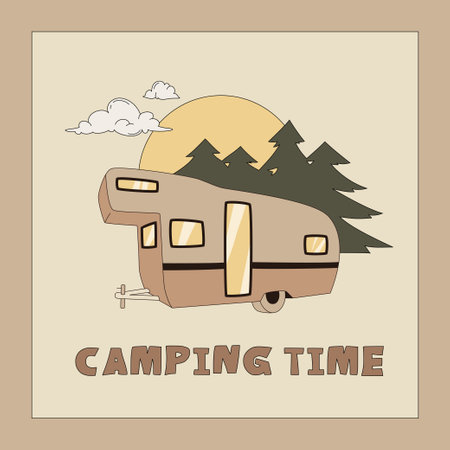1. Overpacking or Underpacking Food
One of the most common food prep mistakes first-time campers make is bringing either way too much food or not nearly enough. Both situations can put a damper on your camping experience and cause unnecessary stress at the campsite.
Why Overpacking Food Happens
Many new campers worry about running out of food in the middle of nowhere, so they end up packing more than they actually need. This often leads to:
- Spoiled ingredients if you can’t keep everything cold
- Wasted food that gets thrown away
- A heavier cooler or backpack, making transportation harder
Why Underpacking Food Happens
On the other hand, some first-timers underestimate how much energy outdoor activities burn. They pack too little and end up:
- Hungry during the day and night
- Lacking energy for hiking, swimming, or exploring
- Feeling frustrated by empty stomachs and limited meal options
How Much Food Should You Pack?
The key is finding a balance. You want enough to fuel your trip without overloading your gear. Here’s a simple guide for planning meals:
| Meal | How Much Per Person (Per Day) |
|---|---|
| Breakfast | 1 main item (oatmeal, eggs, etc.) + 1 fruit + 1 drink |
| Lunch | Sandwich or wrap + snack (chips/trail mix) + 1 drink |
| Dinner | Main dish (grilled meat/veggie) + side (rice/potatoes) + dessert or treat |
| Snacks | 2-3 snacks (granola bars, fruit, jerky) |
Pro Tips for First-Time Campers:
- Plan each meal and snack ahead of time—write it all down!
- Packing shelf-stable foods helps avoid spoilage.
- If possible, coordinate meals with others to avoid duplicates.
- Don’t forget water—bring more than you think you’ll need.
2. Neglecting Proper Food Storage
One of the most common mistakes first-time campers make is not storing their food safely. Inadequate food storage can attract wildlife, such as raccoons, squirrels, and even bears. These animals have a strong sense of smell and can easily find your snacks or meals if they’re left out or improperly sealed.
Why Proper Food Storage Matters
When you camp in the U.S., especially in national parks or forests, many animals are used to looking for human food. Not only does this put your campsite at risk for a visit from unwanted critters, but it can also be dangerous for both you and the animals. Bears that become used to human food may have to be relocated or euthanized for safety reasons. That’s why using correct food storage methods is so important!
Common Food Storage Mistakes
| Mistake | Why It’s a Problem | Better Option |
|---|---|---|
| Leaving food out overnight | Attracts animals, increases risk of campsite disturbance | Always pack away food before bed |
| Storing food in tents or sleeping areas | Puts you at risk if animals come looking for food | Store food away from where you sleep |
| Not using bear-proof containers in bear country | Bears can open coolers, backpacks, and even cars! | Use approved bear canisters or lockers where required |
| Improperly sealed packages or bags | Scents escape, attracting curious wildlife | Use airtight containers or resealable plastic bags |
| Forgetting about trash and leftovers | Garbage smells as strong as fresh food to animals | Packing out all trash and storing it securely until you leave |
How to Store Food Safely While Camping
- Use Bear-Proof Containers: In areas where bears are common, always use a bear canister or store your food in provided bear lockers.
- Hang Your Food: If bear-proof containers aren’t available, hang your food at least 10 feet off the ground and 4 feet away from tree trunks.
- Avoid Sleeping With Food: Never bring snacks or any scented items into your tent—even toothpaste counts!
- Clean Up Thoroughly: After meals, wash dishes and clean up crumbs right away to avoid leaving behind tempting smells.
- Packing Out Trash: Keep all garbage in sealed bags or containers and take it with you when you leave.
Bears Aren’t the Only Problem!
Even if you’re not camping in bear country, smaller animals like raccoons and mice are experts at finding unprotected food. They might not be as dangerous as bears, but they can still cause damage to your gear and ruin your trip by stealing your supplies.

3. Forgetting the Cooler Game Plan
If youre new to camping, it’s easy to overlook just how important your cooler setup is. A lot of first-time campers throw everything into the cooler without much thought, but this simple mistake can seriously ruin your trip. Not only can it mess up your meals, but it can also put your health at risk.
Why Cooler Packing Matters
The way you organize your cooler actually makes a big difference. Mixing raw meat with ready-to-eat foods, or not packing enough ice, means you’re risking spoiled food and even food poisoning. Nobody wants to get sick in the great outdoors!
Common Cooler Mistakes First-Time Campers Make
| Mistake | What Can Happen | Better Way |
|---|---|---|
| Packing raw and cooked foods together | Cross-contamination and foodborne illnesses | Use separate containers and keep raw meats on the bottom |
| Not bringing enough ice or ice packs | Food warms up too quickly, leading to spoilage | Pack plenty of ice; block ice lasts longer than cubes |
| Opening the cooler too often | Ice melts faster and food gets warm | Plan ahead—grab what you need all at once |
| Packing the cooler last minute with warm food/drinks | Raises the overall temperature inside the cooler | Pre-chill items before packing them in |
The Right Way to Pack Your Cooler
Start by pre-chilling your cooler with ice before you load it up. Place raw meats at the very bottom (in leak-proof bags), then layer in dairy, eggs, and cooked foods above that. Fill all extra space with ice or frozen water bottles so cold air doesn’t escape easily. And remember: every time you open that lid, you’re letting cold air out! Be strategic about when and how often you access your cooler.
4. Skipping Meal Planning
One of the most common mistakes first-time campers make is heading out without a solid meal plan. It might sound adventurous to just “wing it,” but this approach usually leads to missing key ingredients or scrambling to put together a meal at the campsite. Not having a plan can turn mealtime into a stressful experience, taking away from the fun and relaxation that camping is supposed to bring.
Why Meal Planning Matters
Meal planning helps you pack only what you need, saves space in your cooler, and keeps everyone happy and fed. When you don’t plan ahead, you might forget essentials like cooking oil, spices, or even main ingredients. This often means resorting to bland meals or making emergency trips to a nearby store (if there even is one!).
Common Issues When You Skip Meal Planning
| Problem | How It Happens | Impact |
|---|---|---|
| Missing Ingredients | No checklist; random packing | Meals are incomplete or less tasty |
| Haphazard Cooking | No recipes or prep steps planned | Longer cook times, more stress |
| Food Waste | Packing too much or the wrong food | Spoiled food, wasted money |
| Hangry Campers | Not enough food or snacks packed | Irritable moods, less fun for all |
Quick Tips for Easy Meal Planning
- Make a Menu: List out what you’ll eat for every meal and snack.
- Create a Shopping List: Check off each ingredient as you pack.
- Prep at Home: Chop veggies, marinate meats, or portion snacks before your trip.
- Keep It Simple: Choose meals with minimal ingredients and easy clean-up.
- Packing Essentials: Don’t forget basics like oil, salt, pepper, and utensils!
5. Ignoring Local Campfire and Cooking Regulations
One of the biggest mistakes first-time campers make is not paying attention to local campfire and cooking rules. Every campsite in the U.S. can have different guidelines about what kind of cooking equipment you can use, especially when it comes to open flames, charcoal grills, or gas stoves. These rules are there for safety and to protect the environment—especially during dry seasons when fire risk is high.
Why You Need to Check the Rules
If you show up with your favorite grill or plan on roasting marshmallows over an open fire without checking the regulations, you might get hit with a fine—or worse, find out you’re not allowed to cook at all. This could leave you stuck with nothing but cold sandwiches for dinner! It’s always best to check online or call ahead before your trip.
Common Campground Cooking Regulations
| Cooking Method | Allowed? | Notes |
|---|---|---|
| Open campfires | Varies by season/location | Might be banned during dry periods due to wildfire risk |
| Charcoal grills | Often restricted | Some sites only allow gas or electric grills |
| Gas stoves | Usually allowed | Still may need a permit in some areas |
| Portable fire pits | Check with park office | Rules differ between state parks, national parks, and private campgrounds |
Quick Tips:
- Always look up campground regulations before you pack your gear.
- If unsure, bring a backup like a portable gas stove (with extra fuel).
- If fires are banned, plan easy no-cook meals so you won’t go hungry.
- Respecting these rules helps keep everyone safe—and your camping experience stress-free!

